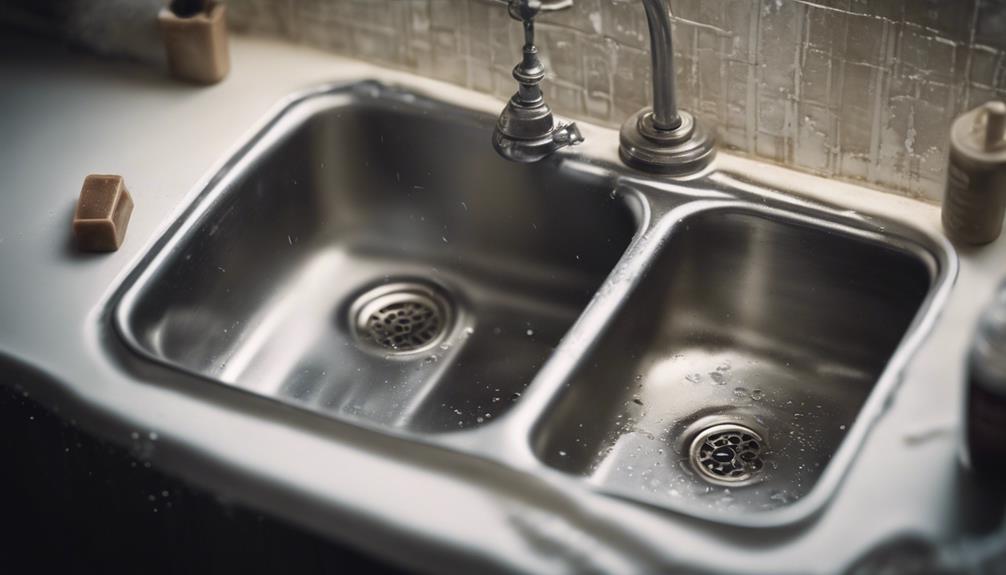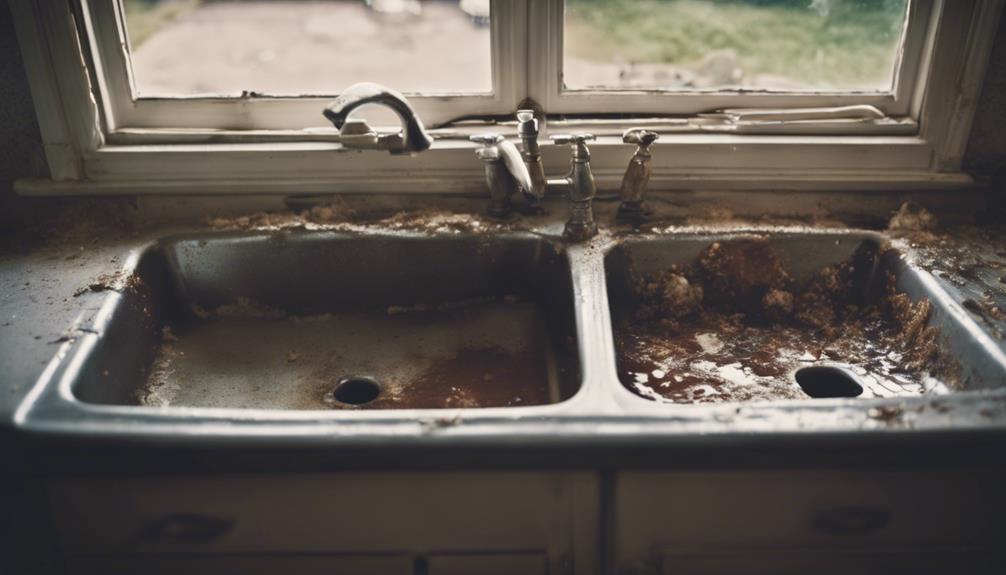You're tired of dealing with a grimy kitchen sink that's covered in stains, soap scum, and who-knows-what-else. To keep your sink shining, start by stocking up on essential cleaning supplies like dish soap, baking soda, and white vinegar. Develop a weekly cleaning routine using natural and eco-friendly products, and remember to clean hidden areas of the sink regularly. For tough stains, try a baking soda and vinegar combo or hydrogen peroxide for deep cleaning. And, don't forget to install a splash guard and sink mat to prevent future messes. From here, you'll uncover even more clever hacks to keep your sink sparkling.
Essential Sink Cleaning Supplies
To keep your kitchen sink clean and hygienic, you'll need the right arsenal of cleaning supplies, including dish soap, baking soda, white vinegar, lemons, sponges, cloths, and toothbrushes. These essentials will help you tackle grease, grime, stains, and bacteria that can accumulate in your sink. By using these supplies, you'll guarantee a thorough and hygienic cleaning process that maintains a clean and odor-free kitchen sink.
Baking soda and white vinegar are particularly versatile ingredients that can be used for cleaning, deodorizing, and disinfecting your sink. As a mild abrasive, baking soda is effective in removing stubborn stains, while white vinegar is a natural disinfectant that can help eliminate bacteria and odors. When combined, these two ingredients can help you achieve a deep cleaning that leaves your sink sparkling clean.
Natural Cleaning Methods Explained
You can harness the power of natural ingredients to create effective cleaning solutions for your kitchen sink, from the classic baking soda and vinegar combo to other surprising alternatives.
When cleaning your kitchen sink, natural methods aren't only eco-friendly but also gentle on surfaces. For a deep clean, mix baking soda and vinegar to create a paste that's perfect for removing grease and grime.
For tough stains, try combining hydrogen peroxide and baking soda for a potent cleaning solution. If you have stainless steel sinks, maintain them with a cream of tartar paste.
For porcelain sinks, salt and lemon juice can remove rust stains. Lemon is also a natural bleach alternative for whitening and deodorizing your sink.
The importance of regular cleaning can't be stressed enough, and natural methods make it easy to keep your sink clean and hygienic. By incorporating these natural cleaning methods into your routine, you'll be able to keep your sink looking its best without exposing yourself or the environment to harsh chemicals.
Sink Material Specific Cleaning

As you explore the world of natural cleaning methods, it's crucial to consider the specific cleaning needs of your sink based on its material.
When cleaning your kitchen sink, it's vital to tailor your approach to the type of sink you have. For ceramic sinks, use a cream cleaner or a homemade paste made from baking soda and water to clean and remove stains.
For stainless steel sinks, buff them with a fine microfiber cloth to remove water marks and maintain them with a gentle cleanser.
When cleaning composite sinks, avoid acid-based cleaners and instead opt for diluted vinegar to remove limescale deposits. Rinse thoroughly after cleaning to keep your sink spotless.
For granite composite sinks, use soapy water and a nylon-bristled brush to scrub stains, and diluted vinegar for limescale removal.
By taking these material-specific cleaning tips into account, you'll be able to clean your kitchen sink effectively, remove water spots and rust, and prevent water stains.
Avoid using abrasive cleaners and harsh chemicals to keep your sink looking its best.
Deep Cleaning Problem Areas
Deep-seated grime and stubborn stains often require more than a routine cleaning, and it's in these problem areas that specialized techniques and ingredients come into play.
When tackling tough stains, you can mix baking soda and white vinegar to create a powerful cleaning solution that scrubs away grime.
For deeper cleaning and disinfection, hydrogen peroxide is an effective solution that also helps remove stains.
If you have a stainless steel sink, create a paste with cream of tartar to polish and remove stubborn stains.
Rust stains can be removed by scrubbing with salt and then buffing the sink with a microfiber cloth and olive oil.
And for a natural way to bleach your sink, try using lemons to whiten and freshen the surface.
Maintenance Routines and Tips

By incorporating a few simple habits into your daily routine, you can prevent the buildup of grime and stains that require specialized cleaning solutions.
Develop a weekly cleaning routine to maintain your kitchen sink's cleanliness and prevent stubborn stains. Install a splash guard and sink mat to protect the sink surface from scratches and damage. This will also help prevent water spots from forming.
Prioritize using natural and eco-friendly cleaning products to maintain a safe and sanitary sink environment. Avoid using abrasive cleaners, which can damage your sink's surface. Instead, opt for gentle cleaners like hydrogen peroxide and baking soda.
Regularly clean tight corners and hidden areas of the sink to prevent mold and bacteria growth, which can lead to unpleasant odors. By following these simple tips, you'll be able to remove stubborn stains and maintain a clean and hygienic kitchen sink.
Conclusion
You've made it! With these top kitchen sink maintenance hacks, your sink will shine like new.
Remember, a clean sink isn't only hygienic, but it also increases your home's value.
In fact, according to the National Association of Realtors, a clean kitchen sink can increase your home's resale value by up to 3%!
So, keep your sink sparkling, and reap the benefits.